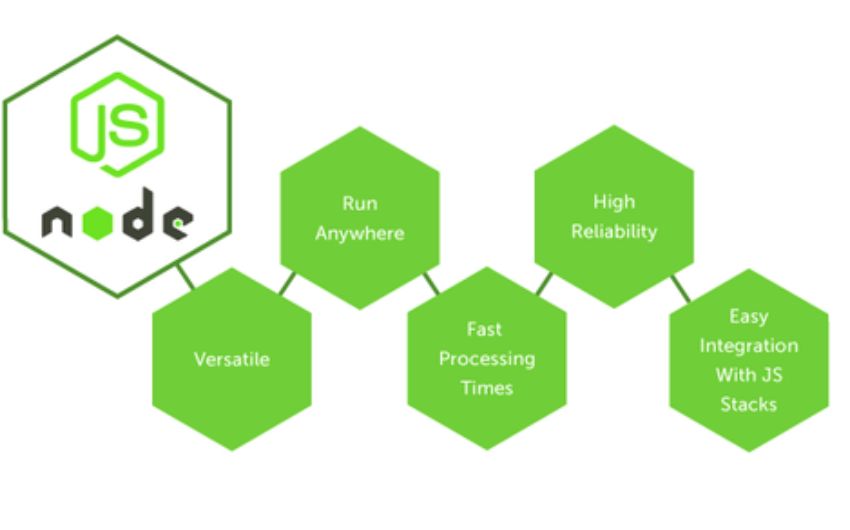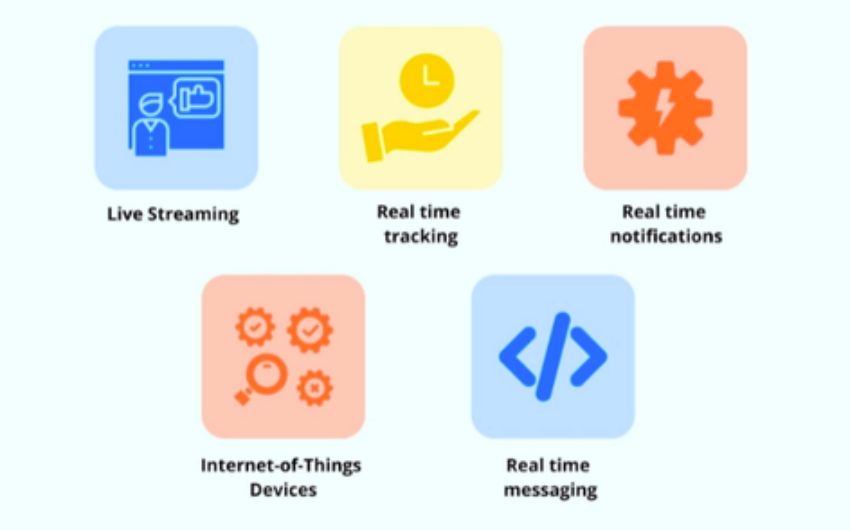
The sky-high popularity of JavaScript is changing the face of web development drastically. The things we are able to do on the web nowadays are truly incredible, and one of the players in this drastic change is servers and browsers with JavaScript.
Back then, several aspects were just imagination in the world of digitalisation, but JavaScript has sculptured our dream into reality.
As we speak, the number of websites worldwide is increasing; currently, we have over 1.9 Billion websites, and around 97.8% of them are running because of JavaScript.
The popularity of JavaScript over the years:
Adroit developers have defined Node.js as the packaged compilation of Google’s V8 JavaScript engine. JavaScript includes a core library, an abstraction layer, and a libuv platform.
The creator of Node.js, Ryan Dahl, intends to create a real-time website that has the capability to perform the tasks that were tricky to do with other frameworks. The inspiration for this framework came from Gmail.
In Node.js, Ryan provided developers with a tool to work on the event-driven IO and non-blocking prototype. As a result, Node.js has become an integral part of the technology stack for building dynamic websites; companies like LinkedIn, Netflix, NASA, Mozilla, GoDaddy, etc., leverage the benefits of this framework.
There are many software development tools available, yet developers have opted for NodeJS despite other technologies in the market for a long time. The survey of Stack Overflow 2020 proves that about 51% of developers choose Node.js as the most popular framework in the category of “Frameworks, Libraries, and Tools”.
The popularity of Node.js is rising with time, and nothing is holding it back. Especially when it comes to developing enterprise applications, nothing beats the functionalities of Node.js, as it provides high performance, scalability, full-stack and MEANstack to the application.
The latest Node.js, version 14, will be available until April 2023. New Node.js features include client-side and web server functionality. Now, we know how successful JavaScript is, and developers adore Node.js. So, let’s take a deep dive into Node.js and discover what it is and why it is the first choice for enterprise application development.
What is NodeJS?
Node.js is an open-source JavaScript runtime on Chrome’s V8. With this framework, you can effortlessly create fast and scalable web applications. Furthermore, as mentioned before, it comprises event-driven IO and a non-blocking prototype, providing a lightweight feature. These features enable real-time applications to run efficiently and effectively across multiple devices.
| The Node.js user survey shows that around 43% of Node developers use the technology to develop enterprise applications. Furthermore, most of these companies are part of the Fortune 500. |
As it shows that 43% of NodeJS developers rely on NodeJS for enterprise development, the technology certainly provides the facilities developers need in an application.
| NodeJS has revolutionised the web development procedure; it brings client and server-side coding under one hood. |
So, let’s take a glimpse of NodeJS’s popularity and comprehend why developers are crazy about this technology to build enterprise apps.
A Glimpse of NodeJS Popularity for Enterprise Applications
The past decade has witnessed a drastic change in the growth and popularity of NodeJS. As a result, it is talk of the town amongst numerous developers on Stack Overflow.
Visual representation of the success of NodeJS:

NodeJS is the first option for enterprise apps because of its scalability and efficiency.

The first thing that developers need in an enterprise app is scalability. It is vital for the business as it is hard to predict the size of a future venture.
A sudden growth in any business could disrupt the existing system and structure of the app. If an application can’t scale quickly, then there are two possibilities. One is competitors might outrun it, and the second is it will collapse under its current weight.
One of the aspects that boost NodeJS success is that it is a single-threaded platform. Therefore, it carries out I/O operations implying callbacks and event lockup. For better understanding, look at the unique architecture of NodeJS that is the most significant help for the developers to manage multiple connections concurrently.
Thus, using NodeJS for the enterprise application is an excellent option because of its ability to handle a large number of connections efficiently.
NodeJS is known for its easy learning curve and long-term support. One of the perks of NodeJS is that learning it is easy and hassle-free. The hustle of learning syntax and grasping the pressure is out of the question as it is a JavaScript-based language.

It is a piece of cake for developers to learn, code, and deploy scalable Node.js applications. Developers can program on Windows and Unix with NodeJS. Even novice developers consider it one of the most straightforward techniques to adopt.
The long-term support of NodeJS lets developers build a business on a particular tech stack and eliminate the bothersome task of changing between various platforms.
Moreover, Node guarantees to fix all of the security problems and bugs during this time. Hence, developers admire its long-term feature. So now, let’s see the use of NodeJS.
What is Node.js Used For?
The most significant advantage of adapting NodeJS is to develop business solutions. It helps you to defeat your competitors using Node.js solutions for enterprises. These are the popular uses of NodeJS.
Real-time Applications

We know that NodeJS can guarantee excellent speed and performance; one of the uses that make Node stand out amongst millions of technologies is real-time messaging or chatting.
The application environment supports heavy traffic of numerous messages or chatrooms while displaying notices to users simultaneously.
IoT Applications
The Statista market revenue of IoT acquired $212 Billion. The connected IoT devices were 26.66 Billion globally, and it is predicted that this number will reach 75.44 Billion by 2025.
According to the UN, in May 2020, 7.78 Billion people were registered in the world population. And an average person owns around 2 or 3 IoT devices. So that means the future is anticipating advanced applications.
Thus it is essential to implement the correct language and framework while developing IoT applications. The synergy of Node.js IoT is the most suitable option for implementing IoT in apps.
IoT applications vigorously utilise a publish-subscribe-based messaging model, MQTT. In turn, for transport and encapsulation, this model uses WebSockets. Both MQTT and WebSockets are well-supported and efficiently integrated with Node.js development.
Reasons for using NodeJS with IoT applications:
- Node js is speedy, effective, and competent in managing large data flows.
- You can efficiently integrate Node.js with the IoT model (Integration with MQTT and WebSockets).
- The Node Package Manager has many valuable IoT modules that support implementing the most ambitious IoT projects.
These are why some big names like Microsoft are already utilising Node.js for IoT development projects.
Single Page Application Development

Node.js creates dynamic websites, social networks, and mailing solutions as single-page applications. Also, the efficiency of asynchronous data flow on the Node.js back-end completes the most profitable single-page application development segment.
Chatbots
Node.js also presents cutting-edge functionalities for chatting applications and real-time chatbots. Its essential features such as intensive data, multi-user apps, heavy traffic capacities, and numerous device compatibility drive it as a famous option for chatbots.

Node.js walks ahead of the pack when it is utilised to run across different devices, surrounding various paradigms in chat apps and chatbots. So, for example, it becomes more manageable to run the server-side event loops and push notifications generally utilised in real-time apps and IMs.
Data Streaming Applications
Streaming defines what it says- that means transmitting significant amounts of data in smaller packages rather than a single batch. This capability is particularly essential for audio or video streaming apps.

Node.js is suitable for this task with built-in modules sustaining data streaming and letting to design both readable and writable data streaming platforms. If we take the example of Netflix, a worldwide media service provider, utilises Node.js, you will get a clear idea of how effective the NodeJS environment is.
Reasons Why You Need to Use Node.js for Enterprise Applications
Scalability
Node.js apps are efficiently scalable vertically as well as horizontally. In vertical scaling, add more resources to the current modes, while in horizontal scaling, you can add new nodes faster.
Moreover, Node.js applications don’t need a large block in the whole development process; they perfectly work with a cluster of microservices and modules. It’s straightforward, manageable, and works perfectly for startups striving to expand.
High-Performance
Node.js runs on the Google V8 JS engine that concedes with Javascript code instantly into the device code. This creates it resource-efficient and revs the framework’s speed. Also, Google themselves fund heavily in their search engine to continuously improve their performance.
Liberation to Develop Apps
Developers functioning with Node.js get the liberation to develop cross-platform applications. With frameworks such as Electron and NW.js, you can build cross-platform web applications with Node.js as it’s compatible with devices like desktop, mobile, and web development for Mac, Windows, and Linux.
Node.js is widely preferred for IoT solutions, as we discussed beforehand. So if you are scrutinising to improve your team’s coding efficiency and implementation, Node.js is ace.
Boosts Development Speed
Node.js lets developers accelerate the web app development procedure with its lightweight and various tools. The NPM registry presents multiple solutions, modules, and libraries to build web apps by gaining more significance and funding in a more deficient effort.
Node.js, and NPM libraries, help you diminish bugs and reduce the scope of your web application using its reusable templates. Moreover, this optimisation instantly influences the time to market.
Single Programming Language
Node.js delivers a mixture of the same languages on front-end and back-end Javascript. It is even more convenient and adaptable than it says. It makes the whole web app development cycle strong and seamless for developers and businesses.
NodeJS saves time, energy, and resources, making programmers more effective and beneficial. Apart from making Node.js web app development convenient, it also makes it the most preferred tech in the market.
Large Community Support
From its inception to now, Node.js Foundation has been an outstanding group of originators from leading enterprises like IBM, Microsoft, Fidelity, and SAP. In addition, many software developers and multiple active Node.js fanatics are frequently contributing to the ever-evolving and facilitating Node.js community to sustain fellow developers. Partnering with an AEM development company can further enhance digital experiences by integrating scalable and high-performing web solutions.
Also, Node.js is endowed on Github, making it super manageable and quick to develop and support the framework.
Contribution to Full Stack and MEAN Stack
Node.js has confirmed its potential and is a feature of a robust tech stack with Javascript existing as the undisputed director amongst best programming languages. Moreover, Node.js, as a stand-alone, carries considerable benefits to the tech stack; for example, it presents the JSON module library.
That has over 368,985,988 downloads, i.e. a norm of 1,010,921 per day; Node.js has evolved a powerful player in multiple tech ecosystems.
Wrapping Up
As we have seen that, Node.js is a robust tool delivering outstanding performance in multiple cases. The list of Node.js uses quite a long, and your business may profit from utilising this technology.
Furthermore, the extended Node.js community is continuously developing the platform better and more efficient. The framework perfectly suits enterprise-level apps with I/O operations and thus is excellently fitted for building apps such as news apps, chat apps etc.
NodeJS is known for providing immense benefits; it supports developing enterprise apps with quicker time-to-market without compromising the application’s performance.
Related Articles
-
Why Should You Use Node.js for Your Application
Talking About Why Should You Use Node.js for Your Application, Waiting for your order on the same counter at which you have ordered is annoying for both you and the
-
Need For Adopting Node.js Applications In Global Enterprises
Node.js is an open-source, cross-platform environment on the server-side for networking applications. Node.js applications are written primarily in JavaScript & uses the Google V8 JavaScript search engine to execute the
-
5 Node.js Burning Trends That Will Drive Technology Industry Forward
Node.js is an open-source cross-platform JavaScript runtime environment. It is based on Google Chrome’s V8 engine used for developing server-side and networking applications. Node.js was launched in 2009 and since



